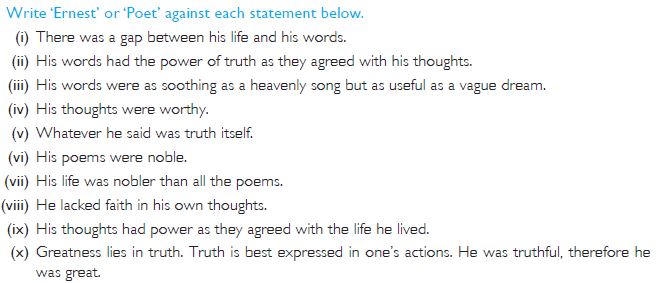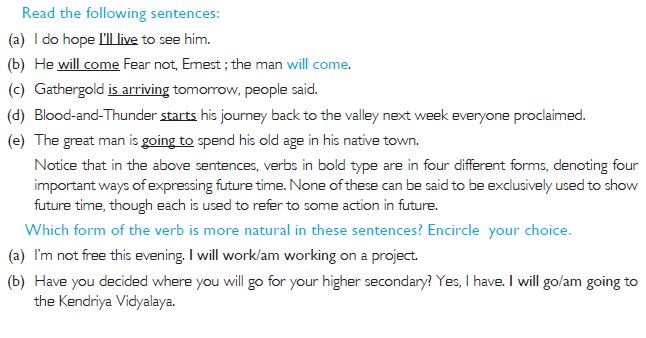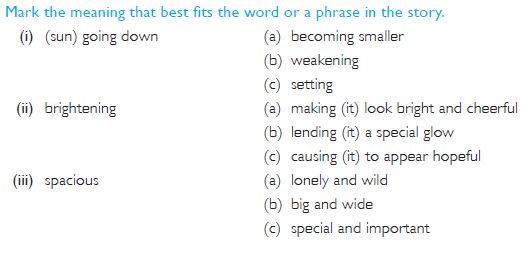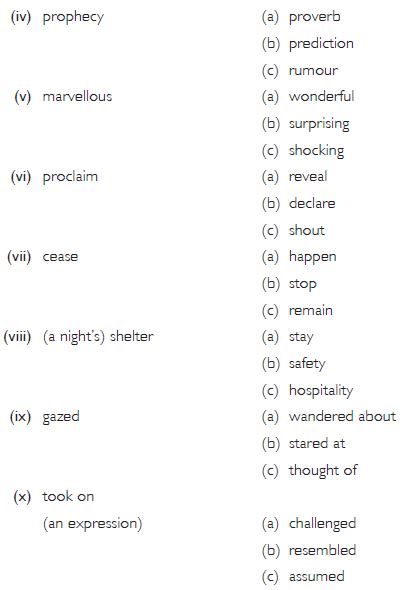Question 1:
Write ‘True’ or ‘False’ against each of the following statements. Ernest’s words reminded people of the wise old sayings.
Answer:
FALSE
Question 2:
Write ‘True’ or ‘False’ against each of the following statements. Total strangers from far away, who visited Ernest in the valley, found his face familiar.
Answer:
FALSE
Question 3:
Write ‘True’ or ‘False’ against each of the following statements. The Great Stone Face confirmed Ernest’s view that the poet could be worthy of its likeness.
Answer:
TRUE
Question 4:
Write ‘True’ or ‘False’ against each of the following statements. When Ernest and the poet met, they respected and admired each other equally.
Answer:
TRUE
Question 5:
Write ‘True’ or ‘False’ against each of the following statements. The poet along with Ernest addressed the inhabitants of the valley.
Answer:
FALSE
Question 5:
Write ‘True’ or ‘False’ against each of the following statements. The poet realised that Ernest’s thoughts were far nobler than his own verses.
Answer:
TRUE
Question 6:
Complete these pieces of conversation using will or going to with the verbs given.
Rani : Why are you turning on the radio ?
Ravi : I __________ (listen) to the news.
Answer:
am going to listen
Question 7:
Complete these pieces of conversation using will or going to with the verbs given. Rani : Oh, I can’t buy this book. I have no money. Ravi : Don’t worry. I __________ (lend) you some.
Answer:
I will lend
Question 7:
Complete these pieces of conversation using will or going to with the verbs given. Rani : Look at those dark clouds. Ravi : I think it __________ (rain).
Answer:
is going to rain
Question 8:
Complete these pieces of conversation using will or going to with the verbs given.
Rani : What shall we have for dinner ?
Ravi : I can’t decide.
Rani : Make up your mind.
Ravi : All right, then. We __________ (have) fried rice and dry beans.
Answer:
will have
Question 9:
Complete these pieces of conversation using will or going to with the verbs given.
Rani : Why are you filling the kettle with water?
Ravi : I __________ (make) coffee.
Answer:
am going to make
Question 10:
Complete these pieces of conversation using will or going to with the verbs given. Rani : We need some bread and butter for breakfast. Ravi : All right. I __________ (go) to the bakery and get some. (Before he goes out, Ravi talks to their father.)
Answer:
I will go
Question 11:
Complete these pieces of conversation using will or going to with the verbs given. Ravi : I __________ (get) some bread and butter. Do you want anything from the bakery?
Answer:
am going to get
Question 12:
Complete these pieces of conversation using will or going to with the verbs given. Ravi : Fine, I __________ (get) you a packet.
Answer:
I will get
Question 13:
How was Ernest different from others in the valley?
Answer:
Ernest was a selfless person. He had no ill-will for anybody. He was very thoughtful and his actions were for the betterment of people.
Question 14:
Why did Ernest think the poet was like the Stone Face?
Answer:
Ernest thought so because the thoughts expressed in his poems stood for great virtues and noble deeds.
Question 15:
What did the poet himself say about his thoughts and poems?
Answer:
The poet said that his thoughts were vague. His life had been different from what was expressed in his poems.
Question 16:
What made the poet proclaim Ernest was the Stone Face?
Answer:
When Ernest was addressing the gathering the poet noticed the resemblance with the Stone Face. So he threw his hands up in the air and proclaimed similarity.
Question 17:

Answer:
(i) poet
(ii) Ernest
(iii) poet
(iv) Ernest
(v) Ernest
(vi) poet
(vii) Ernest
(viii) poet
(ix) Ernest
(x) Ernest
Question 18:
Who, by common consent, turned out to be like the Great Stone Face?
Answer:
Ernest, by common consent, turned out to be like the Great Stone Face.
Question 19:
Who, by common consent, turned out to be like the Great Stone Face?
Answer:
No, Ernest did not believe it. He said that some day, someone wiser than he would appear. He would be the likeness.
Question 20:


Answer:
(a) am working (b) will go (c) won’t hurt (d) will snow (e) is coming
Question 21:
Imagine that you are the poet. You have come to your native valley to meet a famous preacher called Ernest. Narrate the incident of your first meeting with him.
Answer:
One summer evening I arrived at Ernest’s door. He was a famous preacher in my native valley. I found the good old man holding a book in his hand. He was reading the book. At times, with a finger between the pages he looked lovingly at the Great Stone Face. After exchanging greetings, I requested him if he could give me a night’s shelter. Ernest very gladly agreed and remarked that he had never seen the Great Stone Face look so hospitably at a stranger. I was impressed by his hospitality and good natured mannerism.
Question 22:
Put each of the following in the correct order to construct sentences. (a) a resident of Noida near Delhi,/is visually impaired/George Abraham. (b) confidence and competitive spirit/and infuses discipline among the participants / It provides (c) he has helped / The brain behind the World Cup Cricket / the disabled to dream. (d) to the blind school in Delhi / It was a chance visit / that changed his life. (e) sport is a powerful tool/the disabled / He believes that / for rehabilitation of
Answer:
(a) George Abraham, a resident of Noida near Delhi, is visually impaired.
(b) It provides confidence and competitive spirit and infuses discipline among the participants.
(c) The brain behind the World Cup Cricket, he has helped the disabled to dream.
(d) It was a chance visit to the blind school in Delhi that changed his life.
(e) He believes that for the rehabilitation of the disabled, sport is a powerful tool.
Question 23:
Put each of the following in the correct order to construct sentences. (a) a resident of Noida near Delhi,/is visually impaired/George Abraham. (b) confidence and competitive spirit/and infuses discipline among the participants / It provides (c) he has helped / The brain behind the World Cup Cricket / the disabled to dream. (d) to the blind school in Delhi / It was a chance visit / that changed his life. (e) sport is a powerful tool/the disabled / He believes that / for rehabilitation of
Answer:
(a) George Abraham, a resident of Noida near Delhi, is visually impaired.
(b) It provides confidence and competitive spirit and infuses discipline among the participants.
(c) The brain behind the World Cup Cricket, he has helped the disabled to dream.
(d) It was a chance visit to the blind school in Delhi that changed his life.
(e) He believes that for the rehabilitation of the disabled, sport is a powerful tool.
Question 24:
Now rearrange the sentences above to construct a paragraph.
Answer:
George Abraham, a resident of Noida near Delhi, is visually impaired. It was a chance visit to the blind school in Delhi that changed his life. He believes that for the rehabilitation of the disabled, sport is a powerful tool. It provides confidence and competitive spirit and infuses discipline among the participants. The brain behind the World Cup Cricket, he has helped the disabled to dream.
Question 25:


Answer:
(i) (c)
(ii) (b)
(iii) (b)
(iv) (b)
(v) (a)
(vi) (b)
(vii) (b)
(viii) (a)
(ix) (b)
(x) (b).
